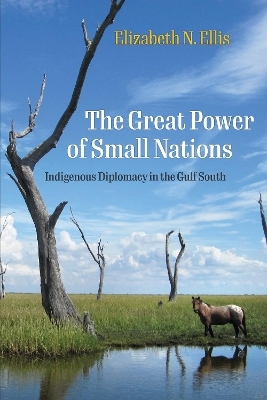
The Great Power of Small Nations
Indigenous Diplomacy in the Gulf South
Seiten
2024
University of Pennsylvania Press (Verlag)
978-1-5128-2707-1 (ISBN)
University of Pennsylvania Press (Verlag)
978-1-5128-2707-1 (ISBN)
A fresh examination of the formidable and resilient Native nations who helped shape the modern Gulf South
In The Great Power of Small Nations, Elizabeth N. Ellis (Peoria) tells the stories of the many smaller Native American nations that shaped the development of the Gulf South. Based on extensive archival research and oral histories, Ellis’s narrative chronicles how diverse Indigenous peoples—including Biloxis, Choctaws, Chitimachas, Chickasaws, Houmas, Mobilians, and Tunicas—influenced and often challenged the growth of colonial Louisiana. The book centers on questions of Native nation-building and international diplomacy, and it argues that Native American migration and practices of offering refuge to migrants in crisis enabled Native nations to survive the violence of colonization.
Indeed, these practices also made them powerful. When European settlers began to arrive in Indigenous homelands at the turn of the eighteenth century, these small nations, or petites nations as the French called them, pulled colonists into their political and social systems, thereby steering the development of early Louisiana. In some cases, the same practices that helped Native peoples withstand colonization in the eighteenth century, including frequent migration, living alongside foreign nations, and welcoming outsiders into their lands, have made it difficult for their contemporary descendants to achieve federal acknowledgment and full rights as Native American peoples.
The Great Power of Small Nations tackles questions of Native power past and present and provides a fresh examination of the formidable and resilient Native nations who helped shape the modern Gulf South.
In The Great Power of Small Nations, Elizabeth N. Ellis (Peoria) tells the stories of the many smaller Native American nations that shaped the development of the Gulf South. Based on extensive archival research and oral histories, Ellis’s narrative chronicles how diverse Indigenous peoples—including Biloxis, Choctaws, Chitimachas, Chickasaws, Houmas, Mobilians, and Tunicas—influenced and often challenged the growth of colonial Louisiana. The book centers on questions of Native nation-building and international diplomacy, and it argues that Native American migration and practices of offering refuge to migrants in crisis enabled Native nations to survive the violence of colonization.
Indeed, these practices also made them powerful. When European settlers began to arrive in Indigenous homelands at the turn of the eighteenth century, these small nations, or petites nations as the French called them, pulled colonists into their political and social systems, thereby steering the development of early Louisiana. In some cases, the same practices that helped Native peoples withstand colonization in the eighteenth century, including frequent migration, living alongside foreign nations, and welcoming outsiders into their lands, have made it difficult for their contemporary descendants to achieve federal acknowledgment and full rights as Native American peoples.
The Great Power of Small Nations tackles questions of Native power past and present and provides a fresh examination of the formidable and resilient Native nations who helped shape the modern Gulf South.
Elizabeth N. Ellis (Peoria Tribe of Indians of Oklahoma) is Associate Professor of History at Princeton University.
Introduction
1. A World of Towns
2. Establishing Relationships with the French
3. Enslaved by Their Allies: Tensas and Chitimachas in French Louisiana
4. Colonial Propaganda and Indigenous Defiance
5. French Transgressions and Natchez Resistance
6. Imperial Blunders and the Revival of Interdependency at Midcentury
7. Tunica Power After the Seven Years’ War
8. The Beginnings of Marginalization
9. Remembering, Forgetting, and Mythologizing the Petites Nations
Afterword
Notes
Index
| Erscheinungsdatum | 05.10.2024 |
|---|---|
| Reihe/Serie | Early American Studies |
| Zusatzinfo | 11 illus., 7 maps |
| Verlagsort | Pennsylvania |
| Sprache | englisch |
| Maße | 152 x 229 mm |
| Themenwelt | Geisteswissenschaften ► Geschichte ► Regional- / Ländergeschichte |
| Geschichte ► Teilgebiete der Geschichte ► Kulturgeschichte | |
| Sozialwissenschaften ► Ethnologie | |
| Sozialwissenschaften ► Soziologie | |
| ISBN-10 | 1-5128-2707-X / 151282707X |
| ISBN-13 | 978-1-5128-2707-1 / 9781512827071 |
| Zustand | Neuware |
| Haben Sie eine Frage zum Produkt? |
Mehr entdecken
aus dem Bereich
aus dem Bereich
der stille Abschied vom bäuerlichen Leben in Deutschland
Buch | Hardcover (2023)
C.H.Beck (Verlag)
CHF 32,15
vom Mittelalter bis zur Gegenwart
Buch | Softcover (2024)
C.H.Beck (Verlag)
CHF 16,80
eine Geschichte der Welt in 99 Obsessionen
Buch | Hardcover (2023)
Klett-Cotta (Verlag)
CHF 34,90


